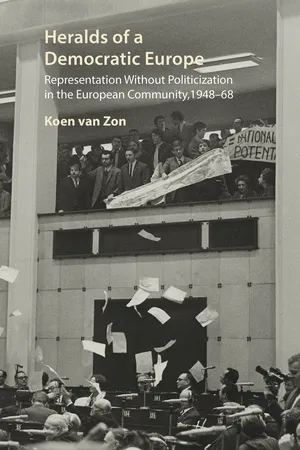
Heralds of a Democratic Europe
Representation without Politicization in the European Community, 1948–68
- English
- ePUB (mobile friendly)
- Available on iOS & Android
Heralds of a Democratic Europe
Representation without Politicization in the European Community, 1948–68
About this book
The received wisdom in European integration history is that, long before the EU was plagued by Euroscepticism and other forms of contestation, there was a "permissive consensus" between European elites and the general public, which allowed European integration to move forward. This book looks beyond this presumed consensus, to ask how the members of European institutions themselves perceived and shaped their relations with European citizens during the early years of the European Communities.
It does so from the perspective of the people who were responsible for representing citizens at the European level: the members of the European Parliament (which represented European citizens) and the Economic and Social Committee (which represented European organised interests). The book follows the first generation of these European representatives in building their institutions during the 1950s and 1960s. It shows that the European representatives sought to democratise the Communities, within the constraints of the legal and institutional framework that was created with the European treaties. In doing so, the book argues, they created new path dependencies and reaffirmed existing ones, but hardly challenged the status quo – characterised later with concepts like the permissive consensus and the democratic deficit. The book shows, then, that the European representatives' ambition to democratise the European Communities from within has shaped European integration in ways that are not fully appreciated and understood by historians and political scientists.
Frequently asked questions
- Essential is ideal for learners and professionals who enjoy exploring a wide range of subjects. Access the Essential Library with 800,000+ trusted titles and best-sellers across business, personal growth, and the humanities. Includes unlimited reading time and Standard Read Aloud voice.
- Complete: Perfect for advanced learners and researchers needing full, unrestricted access. Unlock 1.4M+ books across hundreds of subjects, including academic and specialized titles. The Complete Plan also includes advanced features like Premium Read Aloud and Research Assistant.
Please note we cannot support devices running on iOS 13 and Android 7 or earlier. Learn more about using the app.
Information
Table of contents
- Cover
- Title Page
- Copyright
- Contents
- Acknowledgements
- Abbreviations
- A note on terminology
- Introduction
- 1. Assembly required: debating a parliament for Europe, 1947–50
- 2. The European Political Community (1950–54): built by good Europeans?
- 3. From customs to constitution: institutionalizing the Common Assembly, 1952–58
- 4. The Strasbourg consensus and its discontents, 1958–68
- 5. The dogma of direct elections, 1958–69
- 6. The Consultative Committee and the neo-corporatist pacification of social relations, 1953–58
- 7. The Economic and Social Committee in compulsive search of consensus, 1957–68
- Conclusion: the constraints of consensus
- References
- Bibliography
- Index